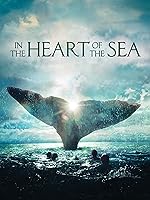|
In the Heart of the Sea, directed by Ron Howard (Warner Bros., 2015) The tale of the Nantucket whaleship Essex is a fascinating look at the old days of whaling. Although I have not yet read Nathaniel Philbrick's book, In the Heart of the Sea: The Tragedy of the Whaleship Essex, which directly inspired this film, I have read Owen Chase's The Wreck of the Whaleship Essex, the contemporary, first-person account by the ship's first mate.
Now the story has come to the big screen, and I have been eager to see it -- so much so that, this weekend, I opted to put off seeing Star Wars: The Force Awakens. (Well, that and I also didn't want to deal with the crowds for the latter.) Overall, director Ron Howard and the cast, led by Marvel Universe heavy hitter (and Capt. George Kirk) Chris Hemsworth, did an exceptional job. Sure, it's not perfect -- the timeline is a little skewed, the bull whale is exaggerated in both size and determination, and the CGI at times pulls you right out of the time period -- but I still left the theater immensely satisfied and eager to read the Philbrick book (and, if I can find it, re-read Chase's account as well). Folks who know the story already might be put off by some of Howard's choices here. For instance, he turned the large-but-otherwise-ordinary whale that sank the Essex into a revenge-driven white whale, a la Moby Dick, stealing something from Melville's creativity by suggesting he simply copied his plot directly from the facts. The fact the whale continues to stalk the whaleboats long after the Essex has vanished beneath the waves assigns a little too much menace to the poor cetacean; perhaps Howard borrowed a page from Orca, but it strains credulity here. And why did he turn the sinking ship into a fireball? I guess he felt the need to add some blockbustery elements, but it's pure fiction. Howard obviously thought the exaggerated route made for a better film, and since he's worth more than me -- largely on the basis of his film credentials -- I won't debate him. Still, I'd have preferred to see something that adheres a little more closely to the truth. But it's a good movie nonetheless, one that puts viewers right there, in the heart of the sea, with Chase and his men. 
|
 Rambles.NET review by Tom Knapp 16 January 2016 Agree? Disagree? Send us your opinions!  



 |

